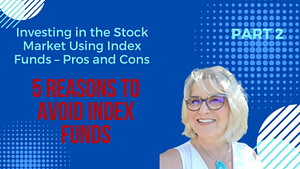
I see many money coaches promote investing in the Stock Market using Index Funds.
As I shared with you in Part 1 of this articles’ series, the main reasons some people choose to invest using Index Funds are the ‘passive nature” and relatively low cost of this kind of investing.
That’s why IRA and 401K accounts offer options to invest in index funds. If you missed Part 1 training in this series, you can also catch up with it on my Youtube channel Millen Livis Channel Wealth.
While Index Fund investing has its merits if you want to take a broad and passive approach with your investment portfolio, there are many reasons (and I’ll share with you top 5 of them in this article) why it may NOT be the best way to achieve your investment goals.
5 Reasons To Avoid Index Funds
1. Lack of Downside Protection.
Over the long term, the Stock Market has proved to be a great investment. However, ALL financial markets go through “bumps and bruises” periods. We’re witnessing a VERY bumpy phase in the Stock Markets right now.
Investing in index funds, for example, in the fund that tracks the S&P 500 index, will give you the upside when the market is going up, but it will leave you completely vulnerable to the downside when markets crush or go through correction.
Remember, Index Funds are Mutual Funds and you cannot place a stop-loss order or a trailing stop order, which would trigger a sell of a stock to limit your losses on certain stock positions.
In other words, limit orders do not apply to the trading of mutual funds. So, you kinda stuck with your Index Funds position unless you decide to sell it manually.
2. Lack of Ability to Adjust Asset Allocation.
Index investing does not allow for Asset Allocation adjustments.
One of the risk management tools is not to invest in any specific stock position more than 5%.
If a particular stock in a fund becomes overvalued, it actually starts to carry more weight in the index, increasing your portfolio exposure to that stock.
So even if you have a clear idea of a stock that is overvalued or undervalued, if you invest through an index fund, you will not be able to adjust – no be able to act on your knowledge.
3. No Control Over Index Fund Holdings
Index Funds are creates as a basket of stocks that are included in some market indexes.
When investors buy an index fund, they have no control over the individual stocks in the portfolio.
You may have specific companies that you like and want to own, and other companies that you couldn’t care less about…
For instance, you may dislike some companies in the Index fund for moral or other personal reasons.
It could be issues with the way some companies treat the environment, or their employees, or the products they make.
The components of index funds are out of your control.
4. Limited Exposure to Different Strategies
There are various strategies that you can use to invest in the Stock market.
Unfortunately, buying an index fund doesn’t give you access to a lot of these strategies.
Yes, Index Funds’ investing will give you diversification.
But that can also be achieved with as few as 10-20 stocks, instead of the 500 stocks that the S&P 500 Index would track.
If you do a bit of research yourself or subscribe to good investment research letters, you may be able to find the best value stocks, the best growth stocks and the best dividend-paying stocks, and use other investing strategies.
And based on your research, you can combine your stocks into a smaller, more targeted portfolio, that is better positioned than the overall market, or one that’s better suited to your personal goals and risk tolerances.
Because different investing strategies can be combined to provide investors with better risk-adjusted returns.
5. Diminished Personal Satisfaction
Frankly, investing can be worrisome and stressful, especially during the times of market turmoil like we experience right now.
It’s true that selecting specific stocks may leave you constantly checking quotes, and can keep you awake at night…
But investing in an index funds will not ease these worries.
You can still find yourself constantly checking on the stock market and feeling worried about losing money.
On top of this, you will diminish the satisfaction and excitement of making good investments and being successful with your money.
The Bottom Line:
- While Index investing is a popular investment strategy, there are reasons why some investors (myself including) might want to avoid index funds.
- Although index funds may be low cost and diversified, they prevent seizing some great investment opportunities.
- Finally, index fund investing does not provide protection from market corrections and crashes.
In the next week’s article – the Part 3 of this series – I’ll talk about costs of investing using Index Funds.
To your Health, Wealth, and Freedom!

